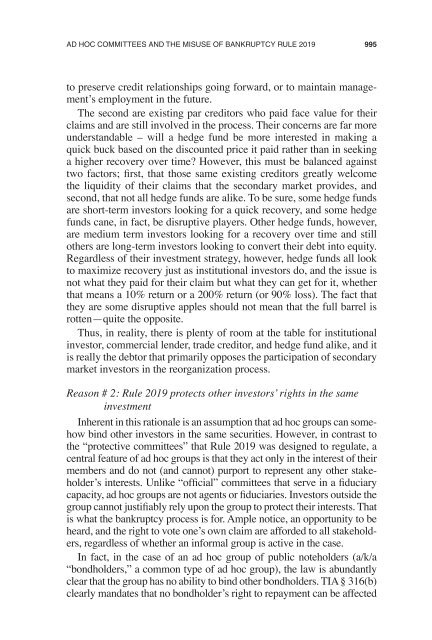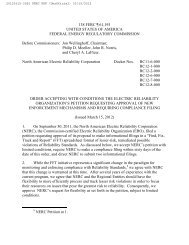Ad Hoc Committees and the Misuse of Bankruptcy Rule 2019
Ad Hoc Committees and the Misuse of Bankruptcy Rule 2019
Ad Hoc Committees and the Misuse of Bankruptcy Rule 2019
Create successful ePaper yourself
Turn your PDF publications into a flip-book with our unique Google optimized e-Paper software.
<strong>Ad</strong> <strong>Hoc</strong> <strong>Committees</strong> <strong>and</strong> <strong>the</strong> <strong>Misuse</strong> <strong>of</strong> <strong>Bankruptcy</strong> <strong>Rule</strong> <strong>2019</strong> 995<br />
to preserve credit relationships going forward, or to maintain management’s<br />
employment in <strong>the</strong> future.<br />
The second are existing par creditors who paid face value for <strong>the</strong>ir<br />
claims <strong>and</strong> are still involved in <strong>the</strong> process. Their concerns are far more<br />
underst<strong>and</strong>able – will a hedge fund be more interested in making a<br />
quick buck based on <strong>the</strong> discounted price it paid ra<strong>the</strong>r than in seeking<br />
a higher recovery over time However, this must be balanced against<br />
two factors; first, that those same existing creditors greatly welcome<br />
<strong>the</strong> liquidity <strong>of</strong> <strong>the</strong>ir claims that <strong>the</strong> secondary market provides, <strong>and</strong><br />
second, that not all hedge funds are alike. To be sure, some hedge funds<br />
are short-term investors looking for a quick recovery, <strong>and</strong> some hedge<br />
funds cane, in fact, be disruptive players. O<strong>the</strong>r hedge funds, however,<br />
are medium term investors looking for a recovery over time <strong>and</strong> still<br />
o<strong>the</strong>rs are long-term investors looking to convert <strong>the</strong>ir debt into equity.<br />
Regardless <strong>of</strong> <strong>the</strong>ir investment strategy, however, hedge funds all look<br />
to maximize recovery just as institutional investors do, <strong>and</strong> <strong>the</strong> issue is<br />
not what <strong>the</strong>y paid for <strong>the</strong>ir claim but what <strong>the</strong>y can get for it, whe<strong>the</strong>r<br />
that means a 10% return or a 200% return (or 90% loss). The fact that<br />
<strong>the</strong>y are some disruptive apples should not mean that <strong>the</strong> full barrel is<br />
rotten—quite <strong>the</strong> opposite.<br />
Thus, in reality, <strong>the</strong>re is plenty <strong>of</strong> room at <strong>the</strong> table for institutional<br />
investor, commercial lender, trade creditor, <strong>and</strong> hedge fund alike, <strong>and</strong> it<br />
is really <strong>the</strong> debtor that primarily opposes <strong>the</strong> participation <strong>of</strong> secondary<br />
market investors in <strong>the</strong> reorganization process.<br />
Reason # 2: <strong>Rule</strong> <strong>2019</strong> protects o<strong>the</strong>r investors’ rights in <strong>the</strong> same<br />
investment<br />
Inherent in this rationale is an assumption that ad hoc groups can somehow<br />
bind o<strong>the</strong>r investors in <strong>the</strong> same securities. However, in contrast to<br />
<strong>the</strong> “protective committees” that <strong>Rule</strong> <strong>2019</strong> was designed to regulate, a<br />
central feature <strong>of</strong> ad hoc groups is that <strong>the</strong>y act only in <strong>the</strong> interest <strong>of</strong> <strong>the</strong>ir<br />
members <strong>and</strong> do not (<strong>and</strong> cannot) purport to represent any o<strong>the</strong>r stakeholder’s<br />
interests. Unlike “<strong>of</strong>ficial” committees that serve in a fiduciary<br />
capacity, ad hoc groups are not agents or fiduciaries. Investors outside <strong>the</strong><br />
group cannot justifiably rely upon <strong>the</strong> group to protect <strong>the</strong>ir interests. That<br />
is what <strong>the</strong> bankruptcy process is for. Ample notice, an opportunity to be<br />
heard, <strong>and</strong> <strong>the</strong> right to vote one’s own claim are afforded to all stakeholders,<br />
regardless <strong>of</strong> whe<strong>the</strong>r an informal group is active in <strong>the</strong> case.<br />
In fact, in <strong>the</strong> case <strong>of</strong> an ad hoc group <strong>of</strong> public noteholders (a/k/a<br />
“bondholders,” a common type <strong>of</strong> ad hoc group), <strong>the</strong> law is abundantly<br />
clear that <strong>the</strong> group has no ability to bind o<strong>the</strong>r bondholders. TIA § 316(b)<br />
clearly m<strong>and</strong>ates that no bondholder’s right to repayment can be affected



